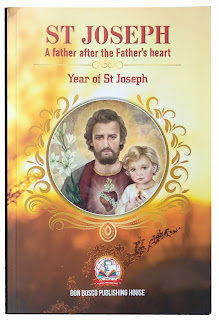Life Lessons from Bergson
Life Lessons from Bergson, Michael Foley, Pan Macmillan, 2013, ISBN
978-1-4472-4561-2, Rs. 350, Pp. 120
Henri Bergson (1859-1941) is
the founder of modern process philosophy. He was the second child of Michael Bergson
and Kate Levinson. Although his parents were devout Jews, he abandoned religion
at an early age. He was influenced greatly by Buddhist philosophy and it is
visible in his though and writings. Another significant influence in his life
is that of William James, his contemporary and friend. The author identifies
the close resemblance of the thought of James and Bergson and often quotes from
James’ works to illustrate certain points.
The first chapter introduces
the idea of process. Monotony is not something people appreciate today, in our
fast paced, media dominated world. Novelty is the catchphrase. On the flipside,
there are many among us who live in denial of the continuous change we
experience. Process implies nothing final, no repetition in the same way and
nothing fixed. Change is the essence of process. We usually look for solidity
to base ourselves on especially when it comes to our ideas and beliefs but
Bergson sardonically hints that there is no such solidity, everything changes.
There is no self, therefore selfishness and pride are replaced by solidarity
and understanding.
The idea of a process implies
the concept of time and hence, the second chapter explains Bergson’s
understanding of time as ‘duration’. The age old adage, “Time and tide wait for
no man” reflects the view that time signifies process. Bergson distinguishes
two versions of time-the measured, which refers to clock time, and the
experienced, which he called duration. We have made time the enemy-a result of
our fear of change. This fear primarily arises because we become obsessed with
measured time. We must not learn to manage time, he says, but to let time
manage us. The only escape from time is by submission to it. To experience
duration, Bergson suggests meditation-immersion in the moment. Thereby enabling
us to see the fluidity in events, nature, time.
The third chapter touches on
intuition and its role in acquiring knowledge and beliefs. The process view
propagates the idea of chance over determinism. Some of the beliefs we hold are
difficult to justify and our justifications are seldom the reasons for adopting
the belief in the first place. We often adopt them without reason but see in
them something of ourselves. Thus, intuition becomes a key concept for Bergson.
Intuition lies between instinct and reason, and intelligence is guided by
instinct. When we fail to live in duration we become automatons-merely doing
things, often as a result of habit. Comedy, Bergson points, helps us not to
become petrified by convention or habit.
The fourth chapter deals with
the role humour plays in mundane life. All of us are in danger of becoming
slaves or automatons of habit or convention, which ultimately leads to
petrifaction. The comic is a way of avoiding this pitfall.
The fifth chapter talks of achieving
greater awareness of ourselves and the world around us. The sense of sameness
leads to a sense of futility and later to fatigue. Process philosophy helps to
dispel this sense of sameness through time. Similarly, the arts, dispel the
sense of sameness through type. A crucial function of the arts is to prevent,
or break down, dismissive labeling of persons and reveal the singular instead
of the similar, the peculiar instead of the familiar, and the inscrutable
instead of the understood. Bergson admires artists, poets and novelists who are
able to describe reality and our human experience in ways we normally do not. Their
works contain revealing insights about life and for life. They give us a novel
picture of reality.
In order to arrive at an
appreciation of process, perception has to be sharp, memory strong and
attention focused. The sixth chapter deals with these three aspects namely,
memory, perception and attention. Memory and perception are a dynamic duo in
continuous interplay. Perception is the manner we interact with reality. Memory
is all about making connections. Attention is focused perception, perception at
work. It is a complex, dynamic process connected to all other mental functions.
Biology
tells us that we, human beings, are complex organisms. The seventh chapter
introduces us to this view that we are an organism. In a complex organism, the
whole is never merely the sum of its parts and the parts are never entirely
independent of the whole. An organism is a hectic process, operating far from equilibrium
in a ceaseless metabolism that seeks out and draws in nutrients, converts them
to energy, expels waste, and uses the energy to reproduce, and to regulate and
renew its parts. The organismic view reinforces the process view of transience.
People regard those who seek
an exalted status as irrational and delusional. This last chapter, deals with
learning to experience the mystical in life, which is the ‘exalted status’
Bergson refers to. Pleasure and well-being are commonly seen as ends or goals. But
Bergson urges us to go beyond. He is not playing down the importance of
pleasure and well-being but warns against centering our whole life on them. Joy,
understood correctly, goes beyond pleasure and well-being but is considered
naïve in our day and age. He looks to religion in search of joy. He is critical
of religion, which aims to form a closed
group marked by a sense of superiority. He also critiques orthodox religion
saying it gives rise to groupism.
He proposes open religion
spurred on by vitality and marked by the courage to challenge institutionalized
ways of thinking and acting. Mystical experience is open to anyone and is not
reserved to any religion. In order to have a mystical experience, one does not
need a special place or context. One can have it anywhere and at any time. The
mystical experience is characterized by a profound sense of oneness.
In Bergson, we find a
processist celebrating fluidity, a pantheist celebrating oneness, an
emergentist celebrating pure being and an existentialist celebrating personal
freedom and choice. Bergson’s ideas drew quite a bit of attention in his
lifetime. Some of his insights are applicable even today and the author of this
work has tried to bring these to the fore. The homework section of this book provides
indicators for implementing Bergson’s teachings. The book is well written and
gripping. Although one may not readily endorse all that Bergson says, one must
give credit to his attempt to capture and alleviate the human condition. Kudos
to the author for presenting the ideas of Bergson attractively.


Comments
Post a Comment